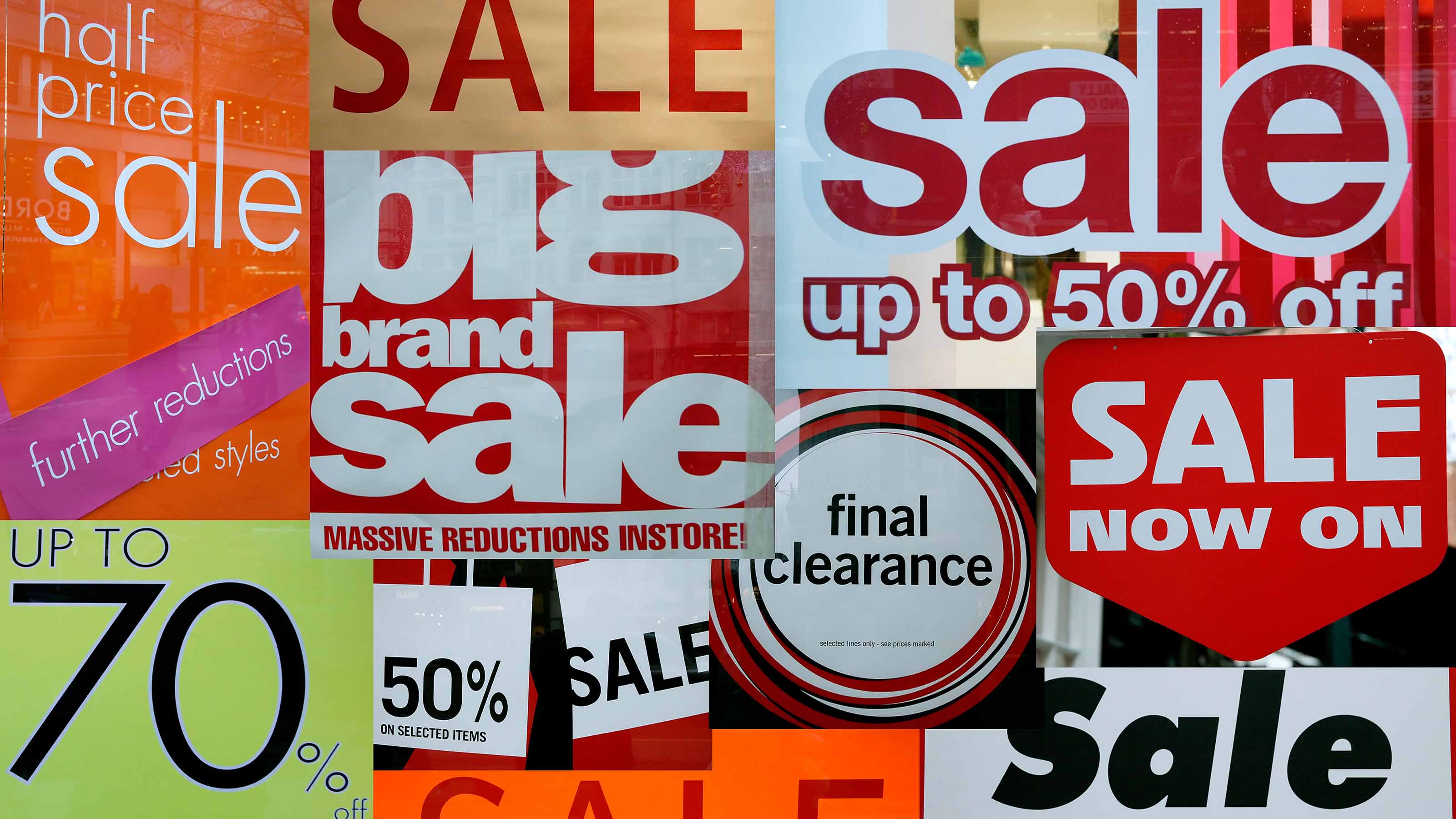9 Winning Retail Stocks You Can Scout at the Mall
As Yogi Berra once said: "You can see a lot just by looking." And nowhere is looking a more powerful tool than in retailing.

Profit and prosper with the best of Kiplinger's advice on investing, taxes, retirement, personal finance and much more. Delivered daily. Enter your email in the box and click Sign Me Up.
You are now subscribed
Your newsletter sign-up was successful
Want to add more newsletters?

Delivered daily
Kiplinger Today
Profit and prosper with the best of Kiplinger's advice on investing, taxes, retirement, personal finance and much more delivered daily. Smart money moves start here.

Sent five days a week
Kiplinger A Step Ahead
Get practical help to make better financial decisions in your everyday life, from spending to savings on top deals.

Delivered daily
Kiplinger Closing Bell
Get today's biggest financial and investing headlines delivered to your inbox every day the U.S. stock market is open.

Sent twice a week
Kiplinger Adviser Intel
Financial pros across the country share best practices and fresh tactics to preserve and grow your wealth.

Delivered weekly
Kiplinger Tax Tips
Trim your federal and state tax bills with practical tax-planning and tax-cutting strategies.

Sent twice a week
Kiplinger Retirement Tips
Your twice-a-week guide to planning and enjoying a financially secure and richly rewarding retirement

Sent bimonthly.
Kiplinger Adviser Angle
Insights for advisers, wealth managers and other financial professionals.

Sent twice a week
Kiplinger Investing Weekly
Your twice-a-week roundup of promising stocks, funds, companies and industries you should consider, ones you should avoid, and why.

Sent weekly for six weeks
Kiplinger Invest for Retirement
Your step-by-step six-part series on how to invest for retirement, from devising a successful strategy to exactly which investments to choose.
The greatest mutual fund manager of the 20th century once explained a secret to his success: “I began my search for new selections in the usual fashion. I headed straight for my favorite source of investment ideas: the Burlington Mall.”
9 Enticing Dividend-Paying Stock Picks
Those are the words of Peter Lynch, manager of Fidelity Magellan in its heyday, from 1977 to 1990, when the fund racked up an annualized return of 29%—twice the rate of Standard & Poor’s 500-stock index. In a series of books that Lynch wrote after he retired, he said that if individual investors would put the “power of common knowledge” to work, they could gain an edge over professionals. Look around you and, as the subtitle of Lynch’s One Up on Wall Street put it, “use what you already know.”
Lynch went on: “I stumble onto the big winner in extracurricular situations, the way you could: Taco Bell, I was impressed with the burrito on a trip to California…Dunkin’ Donuts, I loved the coffee; and recently the revamped Pier 1 Imports, recommended by my wife. In fact, Carolyn is one of my best sources. She’s the one who discovered L’eggs.”
From just $107.88 $24.99 for Kiplinger Personal Finance
Become a smarter, better informed investor. Subscribe from just $107.88 $24.99, plus get up to 4 Special Issues

Sign up for Kiplinger’s Free Newsletters
Profit and prosper with the best of expert advice on investing, taxes, retirement, personal finance and more - straight to your e-mail.
Profit and prosper with the best of expert advice - straight to your e-mail.
Egg-cellent. Carolyn found the pantyhose in an ovoid plastic container, sold in supermarkets, and Peter invested in the manufacturer, Hanes Corp. “It turned out to be a six-bagger,” he wrote, meaning that Lynch’s investment in Hanes sextupled in value before the company was acquired. Lynch essentially was making the same point that Yogi Berra once did: “You can see a lot just by looking.” And nowhere is looking a more powerful tool than in retailing.
We all go to the equivalent of Burlington Mall, which is located in Burlington, Mass., and we all have opinions about where we get good quality, selection and service. We can see which stores have a lot of foot traffic, and which have imaginative merchandising and appealing prices. Do such attributes translate into strong profits? Not always. But looking is the starting point.
Unfortunately, many of the best retailers, including Neiman Marcus, Toms Shoes and J. Crew, are privately owned. But that leaves scores of smaller retail chains for you to ferret out.
Michael Kors Holdings (symbol KORS) is a good example of what you can find. Based in Hong Kong but with corporate offices in New York City, Kors designs men’s and women’s apparel and accessories—high-end but not outrageously priced—and sells them in more than 200 of its own retail stores around the world, as well as in more than 2,000 department stores. If you shop at Kors, you know that the chain’s merchandise has caught fire in recent years—especially its terrific women’s clothes, shoes and logo-heavy handbags. They’re sold in what my fashion-editor daughter calls “stores that are all polished chrome and mirrors, very glam and eye-catching.”
When the company went public on December 15, 2011, Michael Kors, along with private-equity investors, scored a windfall. But Kors remained with the firm as its chief creative officer. John Idol, the highly regarded CEO, stayed, too. The stock has soared, rising from a close of $24.20 on its first day of trading to $69 today (all prices are as of August 2). But even if you missed investing in a near-three-bagger, Kors is still attractive. Revenues rose 68% for the fiscal year that ended March 30, and earnings jumped from 78 cents to $1.97 per share. The stock’s price-earnings ratio, based on estimated profits, is 27—perfectly reasonable for a company growing so fast.
The best retailers, like the best handbags, don’t come cheap, so look to buy on dips. Lululemon Athletica (LULU), the Vancouver, Can.–based purveyor of gloriously colored yoga outfits that has a cultlike following, took a huge dive, from $82 to $61, during a two-week period in June—after the CEO resigned on the heels of the embarrassing revelation that a fabric used in Lululemon clothes was too easy to see through. The stock, which has recovered to $73, still isn’t cheap, at 36 times estimated earnings for the fiscal year that ends next January. But analysts expect earnings to jump a robust 29% the following year, suggesting that the stock is reasonably priced.
Lululemon and Michael Kors have the power of quality and personality on their side, helping them to ward off competitors and allowing them to charge premium prices. That description also fits Tumi Holdings (TUMI), which sells the luggage it makes through 114 company-owned stores and another 1,700 distribution points in 75 countries. Tumi went public in April 2012 at $18, soared to $26.50 on its first day of trading and is now at $25. The stock’s price-earnings ratio—29, based on estimated 2013 earnings—seems reasonable, given that analysts expect earnings to rise by 25% next year.
As for what my own eyes have seen, the world has two great luxury retailers. The first is Hermès International (HESAY), which has perfected the art of charging high prices by limiting the supply of hugely desirable items. With 25 stores in the U.S. and another 300 in other countries, the Paris-based company charges $10,000 and up for its Birkin handbags, and the waiting list for these and other hot products is often more than a year. The company swatted away the 2007–09 recession like a pesky mosquito. Revenues have doubled since 2007, and profits rose from 288 million euros to 740 million euros (about $979 million).
Hermès’s American depositary receipts trade on the pink sheets—the non-Nasdaq over-the-counter market—which means volume is limited. Still, your broker should be able to buy the stock for you, either here or on the bourse in Paris. A bonus of owning the stock, which goes for $35, is that you’ll receive the most gorgeous annual report you’ll ever see.
My second favorite is Loro Piana, the Italian maker of fine scarves, sweaters and other apparel, with 17 stores in the U.S. and hundreds of others around the world, including ten in China. The family that owned Loro Piana sold it in July for $2.6 billion to LVMH Moët Hennessy Louis Vuitton (LVMUY), the largest luxury retail conglomerate in the world. LVMH owns the eponymous leather-goods and wine makers, as well as retail brands such as Céline, Thomas Pink, Pucci, the Sephora cosmetics chain and many more. LVMH, whose ADRs trade for $37, has been accumulating shares of Hermès and now owns nearly 25% of the firm.
Let’s go downscale a bit to Zara, whose success is evident once you step into a store. The shoppers who jam its stores can, says my daughter, “get on-trend items that look chic and expensive, with a sleek, tailored European cut, but you’re spending an average of less than $300 for three or four pieces.” Zara is the flagship chain of Spain’s Industria de Diseño Textil (IDEXY), or Inditex Group, which is also introducing Massimo Dutti, another superb, more upscale chain, to America. Of Zara’s 1,763 stores, 44 are in the U.S. Inditex’s ADRs trade for $27.
Another consumer favorite is Destination Maternity (DEST), which owns A Pea in the Pod and other chains (a total of 606 stores) for expectant mothers. At $30, the stock is well priced and delivers an above-average dividend yield of 2.5%. Williams-Sonoma (WSM), the cream of the kitchen-gadget purveyors, charges premium prices and offers superb service—plus extravagant catalogs and a great Web site. The stock fetches $61 and yields 2.0%. Also providing a welcoming experience for consumers is Home Depot (HD), the best of the big-box stores. I recommended the stock in the December 2012 issue of Kiplinger’s at three-fourths its current price of $80, and I still like it.
Take my advice, or better yet, look for your own winners. Just remember that when you go to the mall, keep your eye out for stock bargains, too.
James K. Glassman is the founding executive director of the George W. Bush Institute in Dallas. He owns none of the stocks mentioned.
Profit and prosper with the best of Kiplinger's advice on investing, taxes, retirement, personal finance and much more. Delivered daily. Enter your email in the box and click Sign Me Up.

-
 Betting on Super Bowl 2026? New IRS Tax Changes Could Cost You
Betting on Super Bowl 2026? New IRS Tax Changes Could Cost YouTaxable Income When Super Bowl LX hype fades, some fans may be surprised to learn that sports betting tax rules have shifted.
-
 How Much It Costs to Host a Super Bowl Party in 2026
How Much It Costs to Host a Super Bowl Party in 2026Hosting a Super Bowl party in 2026 could cost you. Here's a breakdown of food, drink and entertainment costs — plus ways to save.
-
 3 Reasons to Use a 5-Year CD As You Approach Retirement
3 Reasons to Use a 5-Year CD As You Approach RetirementA five-year CD can help you reach other milestones as you approach retirement.
-
 5 Big Tech Stocks That Are Bargains Now
5 Big Tech Stocks That Are Bargains Nowtech stocks Few corners of Wall Street have been spared from this year's selloff, creating a buying opportunity in some of the most sought-after tech stocks.
-
 How to Invest for a Recession
How to Invest for a Recessioninvesting During a recession, dividends are especially important because they give you a cushion even if the stock price falls.
-
 10 Stocks to Buy When They're Down
10 Stocks to Buy When They're Downstocks When the market drops sharply, it creates an opportunity to buy quality stocks at a bargain.
-
 How Many Stocks Should You Have in Your Portfolio?
How Many Stocks Should You Have in Your Portfolio?stocks It’s been a volatile year for equities. One of the best ways for investors to smooth the ride is with a diverse selection of stocks and stock funds. But diversification can have its own perils.
-
 An Urgent Need for Cybersecurity Stocks
An Urgent Need for Cybersecurity Stocksstocks Many cybersecurity stocks are still unprofitable, but what they're selling is an absolute necessity going forward.
-
 Why Bonds Belong in Your Portfolio
Why Bonds Belong in Your Portfoliobonds Intermediate rates will probably rise another two or three points in the next few years, making bond yields more attractive.
-
 140 Companies That Have Pulled Out of Russia
140 Companies That Have Pulled Out of Russiastocks The list of private businesses announcing partial or full halts to operations in Russia is ballooning, increasing economic pressure on the country.
-
 How to Win With Game Stocks
How to Win With Game Stocksstocks Game stocks are the backbone of the metaverse, the "next big thing" in consumer technology.